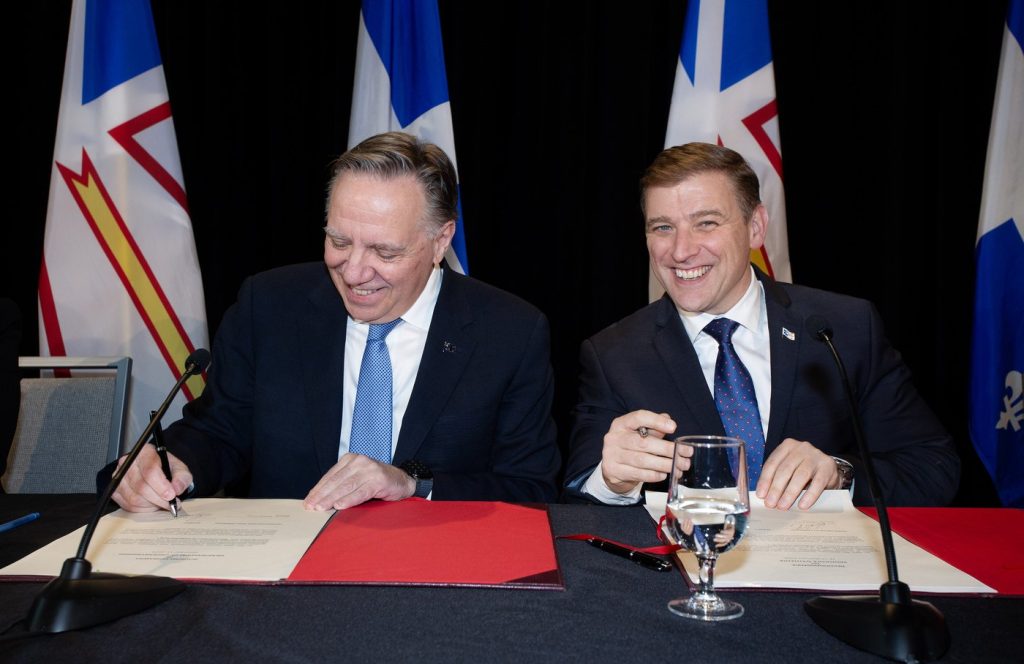ST. JOHN'S, N.L. Premier Andrew Furey of Newfoundland and Labrador announced on Monday that an independent panel of experts will oversee the negotiations for a final energy agreement with Hydro-Québec, the electric utility in Quebec. However, he did not commit to a review of the current memorandum of understanding.
The Liberal government of Newfoundland and Labrador commenced a four-day legislative debate concerning a memorandum of understanding that promises substantial job creation and revenue generation between Hydro-Québec and the province. This agreement centers around Hydro-Québec paying significantly more for electricity from the Churchill Falls hydroelectric plant located in Labrador and collaborating with Newfoundland and Labrador Hydro on additional projects along the Churchill River.
Opposition political leaders utilized much of the first day of debate to advocate for an independent assessment of the tentative agreement. They cited previous megaproject failures as a basis for their request. Tony Wakeham, the leader of the Opposition Progressive Conservatives, expressed his confusion regarding the government's reluctance to allow such a review, emphasizing the potential enormous impact of the contract on opportunities within the province.
In his response, Premier Furey pointed out that independent firms have already been involved in providing advice during the negotiation process. He assured that the government would continue to enlist independent oversight, with plans for regular updates to the cabinet and oversight of the negotiating team as discussions progress toward the agreement's final stages. Furey defended the government’s position by stating that claims of no independent input thus far are misleading.
The tentative agreement represents a significant shift from the existing contract between Hydro-Québec and Newfoundland and Labrador, which was established in 1969. Under that long-standing agreement, Hydro-Québec obtained power from Churchill Falls at prices significantly below market value. Efforts by Newfoundland and Labrador to challenge that contract culminated in a Supreme Court ruling in 2017, concluding their attempts to overturn the deal.
The existing contract is set to expire in 2041, but Hydro-Québec has agreed to terminate it early. The new arrangement will see Hydro-Québec pay approximately thirty times more for power from the Churchill Falls facility, yielding an estimated increase of $17 billion in revenue for Newfoundland and Labrador's treasury by 2041. Additionally, Hydro-Québec will pay Newfoundland and Labrador Hydro $3.5 billion to secure the partnership on expansion projects involving both the existing hydroelectric facility and new installations along the Churchill River.
The province of Newfoundland and Labrador is grappling with a comprehensive budget of about $10.4 billion for the year, coupled with a net debt that totals approximately $17.7 billion. According to Statistics Canada, the province recorded the second-highest net debt per capita in the country as of 2022, second only to Ontario. Much of Newfoundland and Labrador's financial strain arises from the high costs associated with the Muskrat Falls hydroelectric project, which has faced numerous delays and exceeded budgetary projections significantly. A public inquiry into the project's failures had resulted in a report with several recommendations, including that the government should hire independent experts to evaluate any projects with budgets exceeding $50 million.
Officials from Newfoundland and Labrador Hydro have confirmed that various independent firms, including JP Morgan, provided advice during the negotiation phase. Premier Furey stated that the agreement is still in the preliminary and non-binding stage, highlighting that public debate is part of the government's commitment to transparency, a contrast to the processes that preceded the Muskrat Falls project.
Furey concluded that oversight will continue through the independent expert panel tasked with advising the cabinet throughout negotiations. These definitive agreements are expected to be presented back to the legislature for a final vote once completed, inviting further scrutiny and participation from the public.
The Churchill Falls hydroelectric facility possesses a generation capacity of approximately 5,400 megawatts and generates around 34 billion kilowatt-hours annually, enough energy to power Denmark, according to U.S. Energy Information Administration data.










